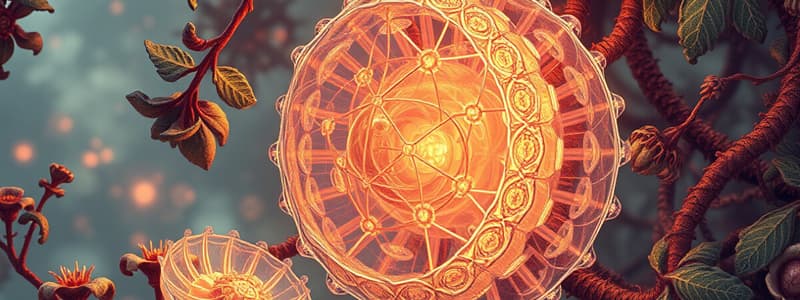Podcast
Questions and Answers
What is diffusion?
What is diffusion?
The movement of molecules from an area of higher concentration to lower concentration.
What is osmosis?
What is osmosis?
The diffusion of water through a cell membrane.
What is active transport?
What is active transport?
The movement of a substance through a cell membrane that requires energy.
What is the cell membrane?
What is the cell membrane?
What is photosynthesis?
What is photosynthesis?
What is respiration?
What is respiration?
What is a product?
What is a product?
What is a reactant?
What is a reactant?
What are producers?
What are producers?
What are chloroplasts?
What are chloroplasts?
What is chlorophyll?
What is chlorophyll?
What are pigments?
What are pigments?
What part of a plant takes in water and nutrients from the soil?
What part of a plant takes in water and nutrients from the soil?
What is soil?
What is soil?
What are stomata?
What are stomata?
What does xylem do?
What does xylem do?
What are the reactants and products of photosynthesis?
What are the reactants and products of photosynthesis?
What are the reactants and products of respiration?
What are the reactants and products of respiration?
Where do organisms get their energy?
Where do organisms get their energy?
What is needed for a plant to make carbohydrates, proteins, and fats?
What is needed for a plant to make carbohydrates, proteins, and fats?
What is the original source of energy that allows the process of photosynthesis to occur?
What is the original source of energy that allows the process of photosynthesis to occur?
What is the equation for photosynthesis?
What is the equation for photosynthesis?
What is the process by which water and carbon dioxide produce carbohydrates, proteins, and fats?
What is the process by which water and carbon dioxide produce carbohydrates, proteins, and fats?
Flashcards are hidden until you start studying
Study Notes
Cell Transport Mechanisms
- Diffusion: Movement of molecules from an area of high concentration to low concentration.
- Osmosis: Specific type of diffusion, involving the movement of water through a cell membrane.
- Active Transport: Movement of substances across a cell membrane that requires energy.
Photosynthesis Overview
- Photosynthesis: Process converting light energy into chemical energy, producing food (carbohydrates, proteins, fats) for plants and certain organisms.
- Influenced by light intensity and temperature; optimal conditions enhance the rate of photosynthesis.
- Chloroplasts: Organelles in plant leaves where photosynthesis occurs, converting reactants to products.
Key Components of Photosynthesis
- Chlorophyll: Pigment in chloroplasts that absorbs sunlight and initiates photosynthesis.
- Reactants: Carbon dioxide, water, and sunlight are essential for photosynthesis.
- Products: Glucose (sugar) and oxygen are produced by the process.
Role of Plant Structures
- Roots: Absorb water and nutrients (e.g., nitrogen, magnesium) from the soil.
- Soil: Provides necessary nutrients for plant growth.
- Stomata: Openings on leaves allowing gas exchange—carbon dioxide in and oxygen out.
- Xylem: Vascular tissue in stems transporting water from roots to the rest of the plant.
Energy Flow in Ecosystems
- Producers: Organisms, primarily plants, that create their own food through photosynthesis.
- Energy Source: All organisms derive energy directly or indirectly from sunlight.
Cellular Respiration
- Respiration: Process by which animal cells extract energy from glucose, releasing carbon dioxide as waste.
- Reactants for respiration include glucose and oxygen; products are carbon dioxide, water, and energy.
Chemical Equations
- Photosynthesis Equation:
- 6CO2 + 6H2O + sunlight → C6H12O6 + 6O2
- Respiration Equation:
- C6H12O6 + 6O2 → 6CO2 + 6H2O + energy
- Photosynthesis and respiration are inversely related processes.
Importance of Photosynthesis
- Plants utilize sunlight, water, and carbon dioxide to produce glucose, the carbohydrate necessary for energy, growth, and survival.
- Glucose can be utilized immediately or stored for later use; it can also be transformed into complex carbohydrates, proteins, and fats for various metabolic functions.
Studying That Suits You
Use AI to generate personalized quizzes and flashcards to suit your learning preferences.




